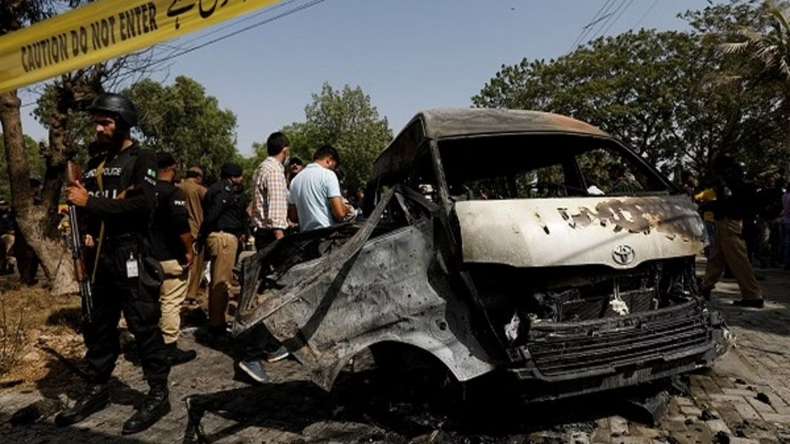
Three Chinese nationals and their Pakistani driver were killed on April 26 when a 30-year-old female suicide bomber assaulted a minibus in the southern Pakistani city of Karachi. The Baloch Liberation Army (BLA), a separatist group fighting for the independence of Pakistan’s southwestern Balochistan province, which borders Iran and Afghanistan, claimed responsibility for the bombing.
The suicide attack is part of a growing Baloch backlash that focuses on the bigger and more complex struggle for Balochistan’s independence, which has lasted decades.
According to Karachi police commissioner Ghulam Nabi Memon, the early investigation indicates that the incident was carried out by a suicide bomber. Closed-circuit television footage from the scene showed a woman wearing a head-to-toe burqa going up to the van, followed by an instantaneous explosion, he claimed.
The director of the Chinese-built Confucius Institute, which offers Chinese language graduate studies, and two teachers were among the Chinese killed. According to university spokesman Mohammad Farooq, the suicide explosion also injured a fourth Chinese national as well as a Pakistani security following the van.
Following the bombing on Tuesday, the separatist group issued a statement identifying the bomber as Shari Baluch or Bramsh, claiming she was the party’s first female bomber. The attack marks “a new chapter in the history of Baluch resistance,” the statement said.
A big number of Chinese citizens have been seen departing Pakistan with personal protective equipment (PPE) kits from Karachi Airport.
China-Pakistan Economic Corridor
China announced an economic project in Pakistan in 2015, totaling USD 54 billion, that comprises a variety of infrastructure and electricity projects, with the Balochistan region playing a key role.

The China-Pakistan Economic Corridor (CPEC) is a road, rail, and pipeline project that aims to connect Pakistan’s southern port of Gwadar on the Arabian Sea, 626 kilometers west of Karachi, to China’s western Xinjiang region.
As part of the One Belt One Road (OBOR) project, a huge number of Chinese engineers and other personnel are working in Pakistan’s Sindh and Balochistan regions. Many Chinese teachers are even instructing Pakistani students in Mandarin at various universities and institutes.
Indigenous Baloch and Sindhi political activists are enraged by this, as they reject any Chinese involvement in their region.
Similar attacks by the BLA
The BLA expanded its operations in 2018 and attacked the Chinese Consulate in Karachi, but were unable to gain inside. In April 2021, a suicide bomber targeted a luxurious hotel in Quetta that was entertaining the Chinese envoy, killing four people and injuring hundreds more. During the attack, the ambassador was unharmed.
Pakistan has long accused its arch enemy, India, of helping militants in Balochistan in secret, an allegation New Delhi rejects.
Edited By: Khushi Thakur
Published By: Bhavya Dedhia













